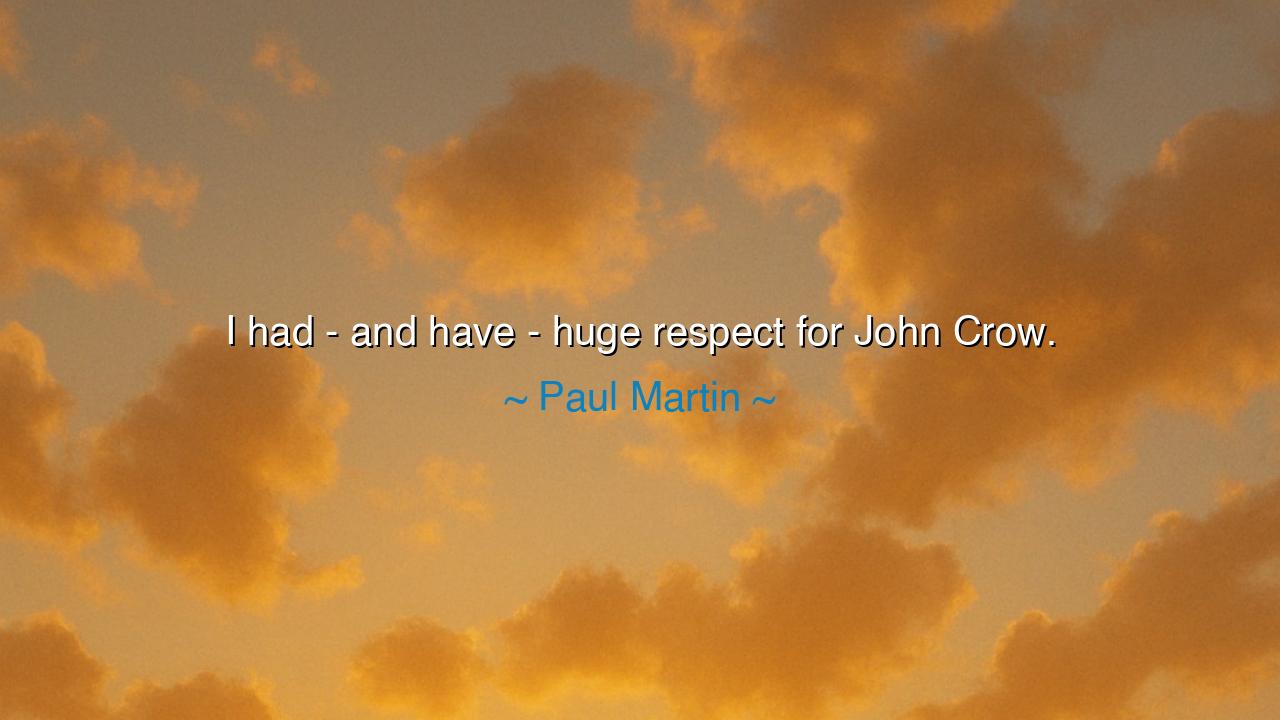
I had - and have - huge respect for John Crow.






Hear, O keepers of memory, the words of Paul Martin, statesman and servant of Canada, who declared: “I had—and have—huge respect for John Crow.” These words, though brief, are laden with weight, for they reveal not only admiration for a man, but also the recognition of principle, of discipline, and of integrity in leadership. To respect in the present and in the past is to confess that such esteem is enduring, unshaken by time, and rooted in truth.
The origin of this saying lies in the turbulent economic years of the late twentieth century, when John Crow, as Governor of the Bank of Canada, stood firm in the face of fierce debate. He was a man who believed deeply in controlling inflation, in protecting the long-term stability of the nation’s currency, even when such policies demanded short-term sacrifice. His discipline was severe, and many opposed him, yet his conviction never wavered. Paul Martin, who would himself later serve as Minister of Finance and Prime Minister, recognized the courage required to hold fast against storms of criticism. Thus his words of respect are not casual, but born of shared struggle and an understanding of the heavy burden of responsibility.
In the realm of leadership, true respect is not won by flattery, nor by popularity, but by fidelity to principle in times of trial. Many seek approval; few dare to withstand the scorn of the multitude for the sake of what they believe to be right. John Crow embodied such daring. He became a figure of controversy, yet also of strength, for he proved that leadership is not bending to the winds of opinion, but anchoring oneself in the rock of conviction. Martin’s admiration acknowledges this rare quality—the ability to serve not for applause, but for the good of the nation.
History offers many parallels. Recall Marcus Aurelius, emperor of Rome, who held firm to the discipline of philosophy while chaos swirled around his empire. Or Winston Churchill, who stood alone against appeasement, enduring ridicule until the truth of his warnings became undeniable. In each case, respect is owed not because these leaders were flawless, but because they had the strength to endure loneliness in the defense of what they deemed essential. So too with Crow: even those who doubted him could not ignore his courage, and those who understood the stakes, like Martin, honored him with enduring esteem.
The deeper meaning in Martin’s words is this: respect transcends agreement. One may differ in approach, question decisions, or even resist policies, yet still honor the integrity and discipline of the person who carries them. In this way, Martin teaches us that respect is not blind loyalty, but recognition of character. It is the ability to see beyond conflict to the steadfast heart that guides action. Such respect, once given, endures through time, for it is not built on convenience, but on truth.
What lesson, then, must we take? It is this: seek to live in such a way that even those who disagree with you may yet honor your integrity. Let your actions be grounded in principle, not in the pursuit of fleeting approval. For approval fades like smoke, but respect endures like stone. To hold to your convictions, even under fire, is to leave behind a legacy that time cannot erode.
Therefore, O listeners, let your practice be this: when you encounter leaders, peers, or adversaries who act with integrity, honor them with respect, even if you question their path. And in your own life, walk with such fidelity to your values that others may one day say of you, as Martin said of Crow: “I had—and have—huge respect.” For in these words lies the true measure of a life well-lived: not the fleeting praise of the moment, but the lasting admiration that spans both past and present.
Thus let Martin’s declaration endure—not as mere tribute to one man, but as a guiding principle for all: that respect, once rooted in courage and integrity, is eternal.






AAdministratorAdministrator
Welcome, honored guests. Please leave a comment, we will respond soon